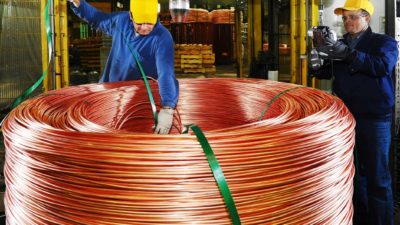The China Evergrande Group (HKG: 3333) crisis is coming to a boil.
And, if left to its own devices, the crisis could spill over into global markets.
At time of writing, the S&P/ASX 200 Index (ASX: XJO) is edging 0.15% into the green after following global markets 0.79% lower during the morning.
A raft of interest and bond payments for the massively indebted Chinese property giant are due this week and next.
The Chinese government has yet to blink on President Xi Jinping's resolve to crack down on China's real estate industry. That crackdown, intended to rein in runaway property prices, is leaving Evergrande investors and debt holders with plenty of uncertainty as to whether the state will step in with aid as it has in the past.
In Australia, there are specific concerns on the potential impact on ASX 200 iron ore shares.
ASX 200 mining giants including BHP Group Ltd (ASX: BHP), Rio Tinto Ltd (ASX: RIO) and Fortescue Metals Group Ltd (ASX: FMG) have already seen their share prices tumble over the past month as iron ore prices collapsed from record highs.
But depending on how the Evergrande saga plays out, there could be more pain ahead.
We'll look at why the BHP, Rio, and Fortescue share prices could be particularly vulnerable to an Evergrande meltdown below.
But first…
What is Evergrande?
Many ASX 200 investors have likely never heard of Evergrande until the company began making global headlines over its debt woes.
So, who is Evergrande?
According to the company's website:
Evergrande Real Estate owns more than 1,300 projects in more than 280 cities in China and is a forerunner in delivering all houses with fine decoration, guaranteeing no-reason house return and online marketing, to provide a new life of smart housing for more than 12 million proprietors.
What I couldn't find on the website was any mention of the company's ballooning debt concerns.
The company has some US$300 billion worth of liabilities. That's about AU$410 billion of debt to you and me.
According to Bloomberg (quoting in US dollars):
It's a whale in China's high-yield dollar bond market, accounting for about 16% of outstanding notes. Some $83.5 million of interest on a five-year dollar bond comes due Thursday, and failure to pay within 30 days may constitute a default. Evergrande also needs to pay a 232 million yuan ($36 million) coupon on an onshore bond the same day.
If that's not enough to get investors tossing and turning, ABC News adds the following:
"Worsening the company's crisis, it is yet to finish building an estimated 1.4 million apartments that it previously sold off-the-plan to buyers, creating yet another group of people eager to recoup their money amid concerns construction will stop."
And then there's this, also from Bloomberg, "While details on the amount due aren't publicly available, Chinese authorities have already told major lenders not to expect repayment."
Investors in the Chinese property giant have taken note.
The Evergrande share price closed down another 11% yesterday. It's now down 26% over the past 5 days and down 50% over the last month.
As for investors who bought shares in Evergrande at the beginning of 2021? They're sitting on a painful loss of 85%.
What the experts are saying
There is major concern among financial experts about a potential Lehman Brothers like fallout if Evergrande isn't handed some sort of government lifeline.
Societe Generale SA analysts, led by Phoenix Kalen, head of emerging-market strategy in London, said (quoted by Bloomberg):
The repercussions from Evergrande's prospective collapse will likely contribute to China's ongoing economic deceleration, which in turn anchors global growth and inflation, and casts a pall over commodity prices.
Goldman economists, led by Hui Shan, wrote:
With policy makers showing no signs of wavering on property market deleveraging, the latest headlines regarding Evergrande likely suggest that housing activity may deteriorate further in the absence of the government providing a clear path toward an eventual resolution.
Ding Shuang, chief economist for Greater China at Standard Chartered, offered a slightly more upbeat appraisal, saying:
Even though most people don't expect Evergrande to collapse all of a sudden, the silence and a lack of major actions from policy makers is making everyone panic. I expect China to at least offer some verbal support soon to stabilize sentiment.
Jimmy Chang, chief investment officer at Rockefeller Global Family Office, agrees that Chinese government assistance is essential. But will the government deliver?
According to Chang (quoted by CNBC):
Everyone was expecting the government would have some kind of resolution, given that Evergrande is a systemically important company. It has $300 billion in outstanding debt. There is a contagion issue if China Evergrande is not resolved. I think it will end up having some deep-pocketed state-owned enterprises to take over…
It could be a self-fulfilling prophecy. This liquidity issue – real estate is so important to the Chinese economy and the financial well-being of so many Chinese families. Homeownership is over 90%. So many people buy apartments as an investment, so if this thing is not contained, it could become a real black swan…
If China were to have a serious economic issue because of China Evergrande, the rest of the global economy would have contagion from it.
Why ASX 200 iron ore shares could be hit
China, as you likely know, has the world's most voracious appetite for iron ore.
While it produces some of its own, it also holds the mantle as the globe's biggest importer of iron ore.
Most of that ends up as steel. And roughly half of that is used by China's construction sector.
Should that consctruction sector take a beating, if Evergrande is allowed to sink, it's quite likely that will see a reduced demand for Aussie iron ore.
Or, as Societe Generale's Kalen said above, "cast a pall over commodity prices".
And iron prices have already been tumbling fast.
Less than 2 months ago, in the final weeks of July, a tonne of iron ore was trading at near record highs of US$220.
Today, iron ore retreated another 9% overnight and is currently worth $US93 per tonne.
And that, as you'd expect, has put the ASX 200 iron ore miners under pressure.
Over the past month, the BHP share price is down 15%.
Over that same time, the Rio share price has lost 10% and the Fortescue share price is down a gut wrenching 25%.
Little wonder then that investors in the ASX 200 miners are keeping a close eye on how the Evergrande crisis evolves.
Stay tuned.








